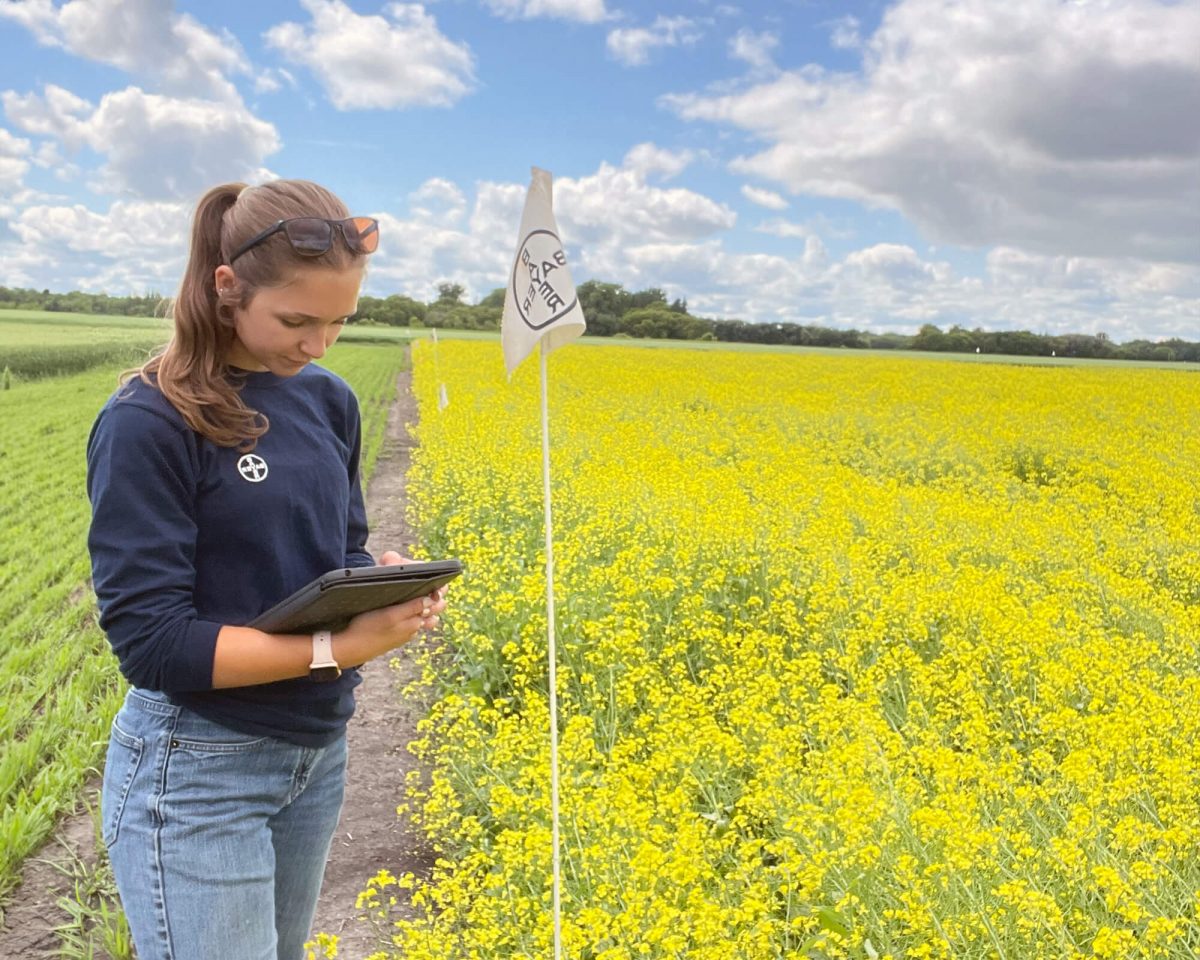
Gabriella Beckta is a third year Agronomy student, currently on her third work term as a Summer Associate in Field Solutions for Bayer CropScience.
Co-operative education programs give students competitive edge
Co-operative education programs at the University of Manitoba, like the one in the Faculty of Agricultural and Food Sciences, play a pivotal role in setting up students for success after graduation.
Many students find it daunting to make career decisions before graduation. By participating in a co-op program, they can explore various work environments, industries, and fields, helping them discover where they fit best and what they enjoy most.
In Agricultural and Food Sciences, both diploma and undergraduate degree students can gain academic credit by participating in four-month, full-time work experiences related to their field of study. After completing a co-op term, students frequently report a deeper understanding of the material, often leading to improved grades.
As Co-op Coordinator for the Faculty of Agricultural and Food Sciences, Holly Klann offers career coaching to co-op students, runs job search related workshops, assists students with resume and cover letter writing, and bridges the gap between employers and students.
“Work integrated Learning (WIL) is such an important component of the academic experience. It connects theoretical classroom learning with practical real-world applications, and it helps develop key employability skills such as communication, teamwork, initiative, and problem solving,” said Klann.
“This, along with the applied work experience, makes hiring graduates from a co-op program very appealing to employers. Ultimately, WIL creates a mutually beneficial scenario for both students and employers alike.”
Eighty-six percent of graduates who participated in the co-op program reported that it was beneficial to their career post-graduation. Most of these graduates work in roles related to their field of study, with over half returning to a previous co-op employer.
A co-op designation provides students with a competitive edge when applying for jobs post-graduation. It indicates that they have relevant work experience in addition to academic achievements, allowing prospective employers to assess their abilities before hiring for permanent, full-time positions. Most employers consider evaluating students for future long-term employment as one of the top benefits of hiring co-op students.
Gabriella Beckta is a third year Agronomy student, currently on her third work term as a Summer Associate in Field Solutions for Bayer CropScience. In her previous terms, she worked for Richardson International. She chose to participate in the co-op program initially because she saw it as a chance to work through the summer and make money while also gaining credits. She says her current co-op role has helped her develop adaptability and problem-solving skills.
“My workday is always different as each day is dependent on the trials we are working on in the field, the time of the year and the weather. Some days we are spraying chemicals allocated to a field trial and other days I am planting seeds, or on less busy days we are keeping up maintenance of the fields and yard as well as taking ratings of the trials growth and changes,” said Beckta.
“The biggest benefit of co-op is the development of my leadership and communication skills. It has taught me that being a leader doesn’t mean you have to be the boss; being a leader can be shown and practiced by anyone.”
Beckta’s supervisor, Tony Britton, a Field Agronomist with Bayer, emphasizes that agricultural learning extends beyond the classroom. He encourages students working on summer projects to actively engage, ask questions, and learn about current industry challenges and the solutions their team is developing.
“In Gabby’s case, she’s learning about experimental pesticides, and where they could fit in future markets through field testing,” said Britton.
“The more knowledgeable students become, the greater asset they are to their teams. I am confident that what students like Gabby are learning will provide a lot of value for their future careers in agriculture. It’s truly a win-win for both supervisors and students.”
After graduation, Beckta plans to continue in the agriculture industry as a sales agronomist. Her words of advice to someone considering co-op?
“Just do it! I know it can be intimidating to take a course at the same time as work, but it is such a good experience to have on your resume and the co-op program coordinators have realistic expectations for course load and are very flexible.”
Learn more:
- Co-operative Education Program at the Faculty of Agricultural and Food Sciences
- VIDEO – FAFS Co-operative Education information session
- VIDEO – Meet a Food Science co-op student
- All UM co-ops






